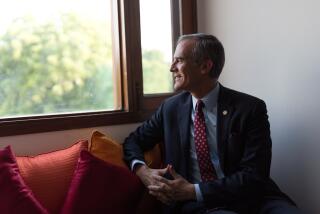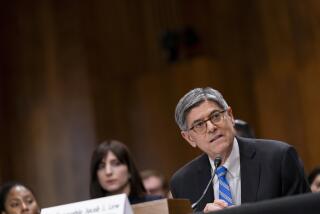FOREIGN SERVICE : A True Professional Is Envoy to Britain
LONDON — He is not rich. He is not politically connected. He is not a contributor to an American presidential election campaign. And he is a highly regarded career diplomat.
Raymond Seitz, 50, thus, would appear a most unlikely choice as U.S. ambassador to the Court of St. James’s, as the London post is known. It is a job that traditionally goes to a wealthy, political contributor.
In the past, the London embassy has been studded with the names of famous American families: Adams, Mellon, Lowell, Kennedy, Harriman, Whitney, Annenberg. More recently, the last three ambassadors have been Republican Party fund-raisers: John Louis, Charles Price and Henry Catto.
But the appointment last weekof Ray Seitz, an outgoing, knowledgeable professional, has been hailed by people like Theodore Wilkinson, president of the American Foreign Service Assn., who have lobbied for career diplomats being named to major foreign posts.
Of the 138 American embassies abroad, two-thirds are filled by career diplomats. But these are confined largely to Third World countries where the living conditions are difficult. The high-profile, comfortable Western European and Scandinavian countries are usually filled with political appointments.
The appointments are often embarrassing: nominees have failed to know the name of the capital to which they are being assigned; a prospective ambassador to Singapore made anti-Chinese remarks, failing to realize the country is mostly populated by overseas Chinese; a Scandinavia ambassador was picked up for public drunkenness.
One justification for sending millionaires to plum European embassies is the high cost of entertaining--which comes out of the ambassador’s pocket when the budget invariably is exceeded. But Seitz’s appointment suggests that a diplomat with a comfortable salary (a reported $115,333) is nevertheless suitable for the job.
Seitz has an impressive resume: He served as deputy chief of mission in London from 1984-89 under Price.
Before that, he was executive assistant to Secretary of State George P. Shultz, and most recently assistant secretary of state for European affairs, which included overseeing German reunification.
Seitz’s experience is welcomed by the British, who are worried that their post-World War II special relationship with Washington could be upstaged by the emergence of a united Germany.
Seitz believes that Washington-London ties are as strong as ever, saying: “We have just fought a war together, and that’s the baseline of our relationship.”
More to Read
Sign up for Essential California
The most important California stories and recommendations in your inbox every morning.
You may occasionally receive promotional content from the Los Angeles Times.










